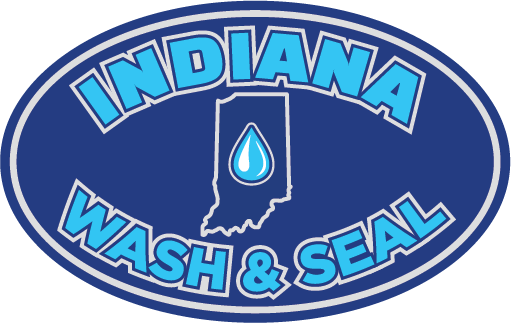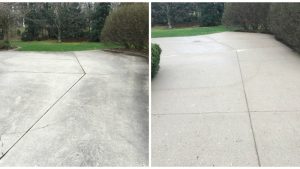Concrete is a ubiquitous material in our modern world, used in everything from sidewalks and driveways to industrial flooring and infrastructure. Its durability and versatility make it a preferred choice for many construction projects. However, despite its robust nature, concrete is not impervious to damage. Over time, it can succumb to wear and tear from various environmental factors, including moisture, chemicals, and freeze-thaw cycles.
To combat these issues and prolong the lifespan of concrete surfaces, professional concrete sealing has emerged as a vital maintenance practice. In this comprehensive guide, we will delve into the benefits of concrete sealing, exploring its protective properties, applications, and the advantages it offers to both residential and commercial property owners.
The Importance of Concrete Sealing
Concrete sealing involves applying a protective coating to the surface of the concrete to enhance its durability and resistance to damage. Our pals at Liberty Power Wash explain how this process is particularly crucial for outdoor concrete surfaces exposed to harsh weather conditions and heavy foot or vehicular traffic. By sealing concrete, property owners can mitigate the risks of cracking, spalling, staining, and deterioration, thus extending the lifespan of their investments.
Benefits of Professional Concrete Sealing
Enhanced Durability and Longevity:
- One of the primary benefits of concrete sealing is its ability to enhance the durability and longevity of concrete surfaces. The sealant forms a protective barrier that shields the concrete from moisture infiltration, preventing cracks, and minimizing the risk of freeze-thaw damage. Additionally, sealing helps to reduce surface abrasion and wear caused by foot traffic, vehicle tires, and other environmental factors, thereby preserving the integrity of the concrete over time.
Protection Against Stains and Discoloration:
- Unsealed concrete is susceptible to staining from oils, grease, chemicals, and other contaminants. These stains not only detract from the aesthetic appeal of the surface but can also penetrate deep into the concrete, making them difficult to remove. Professional concrete sealing provides a barrier against such stains, preventing them from permeating the surface and facilitating easier cleanup and maintenance. Additionally, sealing helps to retain the original color and appearance of the concrete, keeping it looking fresh and attractive for years to come.
Resistance to Water Damage:
- Water infiltration is a common cause of concrete deterioration, especially in regions with fluctuating temperatures and frequent precipitation. When water seeps into unprotected concrete, it can cause cracking, spalling, and erosion, compromising the structural integrity of the surface. By sealing the concrete, property owners can effectively waterproof the surface, preventing moisture intrusion and safeguarding against water-related damage. This is particularly important for outdoor concrete areas such as driveways, patios, and pool decks, which are constantly exposed to moisture.
Reduction of Efflorescence:
- Efflorescence, the white powdery residue that forms on the surface of concrete due to the migration of soluble salts, is a common issue that plagues unsealed concrete. Not only does efflorescence detract from the appearance of the surface, but it can also indicate underlying moisture problems and compromise the structural integrity of the concrete. Sealing concrete helps to minimize efflorescence by blocking the migration of salts to the surface, thus preserving the aesthetic quality of the concrete and preventing potential damage.
Improved Resistance to Chemicals and Abrasion:
- Concrete surfaces in industrial settings, such as warehouses, manufacturing facilities, and parking garages, are often subjected to heavy machinery, chemical spills, and abrasive materials. Without adequate protection, these surfaces can quickly deteriorate, leading to costly repairs and downtime. Professional concrete sealing provides a durable barrier that enhances the surface’s resistance to chemicals, oils, solvents, and abrasion, ensuring long-term performance and reducing maintenance requirements.
Applications of Concrete Sealing
The benefits of concrete sealing extend to a wide range of applications, including:
- Driveways and Walkways: Sealing residential driveways and walkways helps to protect against staining, cracking, and wear from vehicle traffic and pedestrian activity.
- Patios and Pool Decks: Sealing outdoor entertaining areas and pool decks enhances resistance to water damage, staining, and efflorescence, making them more durable and attractive.
- Commercial Flooring: Sealing concrete floors in commercial and industrial settings improves resistance to chemicals, abrasion, and heavy traffic, extending the lifespan of the flooring and reducing maintenance costs.
- Parking Lots and Garages: Sealing parking lots and garage floors helps to protect against oil leaks, chemical spills, and abrasion from vehicle tires, prolonging the life of the surface and enhancing safety for drivers and pedestrians.
- Decorative Concrete: Sealing decorative concrete surfaces, such as stamped concrete patios and stained concrete floors, enhances color vibrancy, protects against fading and staining, and preserves intricate designs for years to come.
Conclusion
Professional concrete sealing offers a multitude of benefits for property owners, ranging from enhanced durability and longevity to protection against stains, water damage, efflorescence, and chemical abrasion. By investing in concrete sealing, homeowners and businesses can prolong the lifespan of their concrete surfaces, reduce maintenance costs, and maintain their aesthetic appeal for years to come. With its wide-ranging applications and proven effectiveness, concrete sealing is a valuable investment in the longevity and performance of concrete infrastructure.



